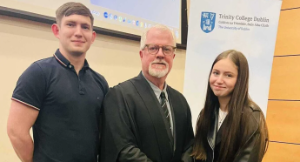 Today, leaders from Ireland’s health service, children’s hospitals, Irish and global cancer research community and industry gathered to launch Molecular and Genomic Interrogation of Childhood Cancer - Ireland (MAGIC-I), the country’s first clinical study of genomics approaches in cancer care.
Today, leaders from Ireland’s health service, children’s hospitals, Irish and global cancer research community and industry gathered to launch Molecular and Genomic Interrogation of Childhood Cancer - Ireland (MAGIC-I), the country’s first clinical study of genomics approaches in cancer care.
MAGIC-I is a five-year clinical study that harnesses the power of genetics, genomics and big data to optimise treatments in childhood cancers. Genomics is the study of an individual’s complete genetic make-up, using cutting edge computational modelling and data science methods to analyse their genes.
The project will put in place the processes to carry out deep genomic analysis for all children and adolescents with cancer in Ireland, including those who have experienced a relapse of their disease.
Speaking at the launch, Dr Colm Henry, Chief Clinical Officer of Ireland’s Health Service Executive (HSE), said: “This launch is a significant milestone in Irish cancer care. It is a great example for the vision of introducing genome sequencing and accompanying research into clinical care, laid out in the ‘National Strategy for Accelerating Genetic and Genomic Medicine in Ireland,’ which was developed by the HSE to advance healthcare using leading edge technology and approaches.”
MAGIC-I was initially funded through a philanthropic donation to University College Dublin (UCD) aimed at bridging clinical activities at Children’s Health Ireland (CHI) hospitals with computational modelling and data science at Systems Biology Ireland (SBI) research centre based at UCD. It was developed in close collaboration between SBI and CHI, in partnership with Precision Oncology Ireland, and industry collaborators including global biotechnology company Illumina which supports the study with its Dragen™ software and sequencing reagents.
Director of SBI, who co-led the data analytics and infrastructure work stream in the national genomics strategy, and a MAGIC-I investigator, Professor Walter Kolch said: “I cannot emphasize enough how big of a signal this is for the Irish healthcare system and likely also beyond it. Importantly, it steps up to a global ambition in its seamless amalgamation of clinical research with advanced computational modelling. It is a trailblazer in incorporating new concepts for personalized medicine, such as digital twins, and for hand-in-glove cooperation between clinical research and cutting-edge computational modelling, which is still very unique.”
Principal Investigator in MAGIC-I and SBI, Professor of Child, Adolescent and Young Adult Oncology at Trinity College Dublin, and Consultant Paediatric Haematologist at CHI, Crumlin, Professor Owen Smith said: “In the past decade, genome sequencing has not only enabled critical advances in our understanding of how leukaemia develops but also why some patients fail to respond to initial treatment, relapse later, or experience severe toxicities leading to injury, secondary illnesses and secondary cancers. The rollout of MAGIC-I will allow the clinical implementation of sequence-based approaches for more precise diagnosis and management of cancers that will ultimately translate into better outcomes for patients. It will allow us to develop personalised treatments for Irish children who develop cancer.”
Also speaking at the launch, Noreen Doyle is a mum-of-four who has been through cancer diagnoses with two of her children and has been a spokesperson and advocate for the advancement of childhood cancer care. She said: “'Your two-year old son has Leukaemia' are words that will forever ring in my ears. If I could have swapped places with my son in that moment, I would have in a heartbeat. In that moment when you get the diagnosis, you hear more words; 'life threatening illness', 'chemotherapy', 'complications from medicines'. The thoughts of what was ahead of my little boy just terrified me - it's every parent's biggest fear. This is why it is so important to advance Precision and Personalised approaches to cancer diagnosis and treatment, so the day that diagnosis comes, families have the comfort of knowing their child will get not only the most effective care but also treatment that minimises the side effects and risks."